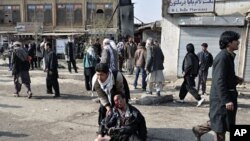Two terrorist bomb attacks in central and northern Afghanistan killed at least 59 people and wounded more than 160 others Tuesday - the holiest day of the Shi'ite Muslim calendar.
The worst of the violence struck the capital Kabul, when at least one suicide bomber detonated explosives near the Abul Fazel shrine as Shi'ite worshipers gathered. The blast killed 55 people - including women and children - and wounded 160 others.
|
Major Kabul attacks this year
|
Kabul police chief General Mohammad Ayoub Salangi said, "The ceremony was about to finish. A new group arrived and the suicide bombers placed themselves among the new group. As a result of the suicide bombing, unfortunately, some of our Muslim mourners have been killed."
Kabul resident Shah Hussein said "I took this wounded person to this emergency hospital for treatment, but here, there is not treatment, and no one cares that I have been waiting here for two hours. I need to take this person to another hospital."
A second explosion, taking place on Ashura, targeted a shrine in Mazar-e-Sharif, the capital of northern Balkh province, killing four people. It is not clear whether Shi'ites were the specific target.
Afghan President Hamid Karzai, still in Germany following Monday's international conference on Afghanistan, condemned the attacks and cancelled his planned two-day visit to Britain to return home. He said "this was the first time that on such an important religious day in Afghanistan terrorism of that horrible nature had taken place."
The Taliban denied involvement in the attacks, calling them "cruel and indiscriminate" and blaming them on the "invading enemy."
View afghanistan - Kabul & Mazar-i-Sharif in a larger map
However, the Pakistan-based insurgent group Lashkar-e-Jhangvi al-Alami claimed responsibility for the Kabul attack. The Sunni extremist group is an offshoot of the bigger Lashkar-e-Jhangvi, which is affiliated with al-Qaida and is responsible for a number of attacks against Shi'ites in Pakistan.
U.S. President Barack Obama strongly condemned the violence, saying the United States continues to stand with the people of Afghanistan against terrorism.
United Nations Secretary-General Ban Ki-moon also condemned in the strongest terms "such indiscriminate attacks against civilians and extended his deepest condolences to the families of the victims."
General John Allen, the commander of the NATO-led International Security Assistance Force in Afghanistan called the attacks "the latest example of insurgents' blatant disregard for human life." He said in a statement that "this killing of Afghans, by Afghans, must come to an end."
Experts say the attacks, which came a day after the conference to discuss Afghanistan's future as international combat troops prepare to leave the country, underscores the importance of what was agreed in Bonn - that all countries in the region need to cooperate in security long-term stability for Afghanistan.
The 10-day Ashura festival, which reaches its peak on Tuesday, marks the death of Imam Hussein, the grandson of the Prophet Muhammad.
Some information for this report was provided by AP, AFP and Reuters.





